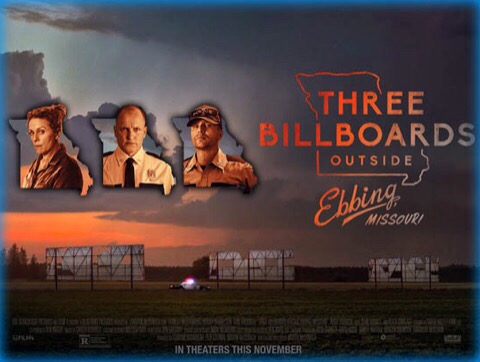Review: Three Billboards outside Ebbing, Missouri
For those of you that don't know, the film is set in the small, rural town of Ebbing, Missouri, where a mother, looking for answers on her daughter's murder, buys three billboards on the outskirts of town. The controversial message calling out the police ignites a feud and the small town mentalities escalate to violence.

I have seen a lot of reviews about some of the more controversial aspects of the film, from the cheap jokes at the expense Peter Dinklage's character to Sam Rockwell's portrayal of a violently, racist cop. But I don't think these are things the film needs to change. Its unapologetic references to such things should act as a wake-up call, just because we have a protagonist does not mean we are supposed to agree with them or even like them. Just take works of literature like Nabokov's Lolita, or Burgess' A Clockwork Orange (which I have just finished reading and reviewed here). Both of these books have protagonists that are violent and perverse, yet their purpose is not to excuse their actions but to invite us to think more closely about them. Similarly, we should be appalled at the lack of punishment for the off-screen actions of Sam Rockwell's character, Officer Jason Dixon, who 'tortured' a black suspect in custody. We are also supposed to realise the self-degrading position of Peter Dinklage's character who openly calls himself the 'town midget' and is the subject of many unnecessary jokes. His monologue at the end flips the scrutiny onto Mildred, and to us as the audience, for judging him without first judging ourselves.
Now I will not say this film is anywhere near perfect. For a film that at the beginning appeared to beg for simplicity, with only a script written title, it is surprisingly complex and sometimes gets confused in its own self-reflexive dialogue to keep consistency. Characters seem to have brief moments of connection and meaning only for a change of pace or throwaway line to undermine most of the impact. After the Chief's suicide, we see a moment of healthy masculine emotion as Jason Dixon and the Desk Sergeant holding each other and crying with the shock, only for it to be ruined by Dixon's need for excessive, violence. While anger is part of grief, it seemed to negate any of the positivity that could have been gleaned from such a touching scene. It is these I propose we start holding writers accountable for. We should praise positive moves and three-dimensional characters while criticising bad story-telling. Hopefully, through this, writers will have no choice but to reflect on their own work and help improve the general quality of future films.
At the end of the day, everyone will take something different from the story. What I think is important to remember is something we see at the very beginning, as the New Times Roman script-esque font quietly reads the title on a black background, it reminds us this is a work of fiction. I believe we should definitely hold writers accountable, hold them up to a standard because only then can we change what gets made. But we should not ask for everything on a plate. We should have morally grey characters that make us question what is ok and what is not, characters may appear to get away with things unpunished without the film condoning the actions of that character. Reflective films, such as this, should allow us to make up our own mind on characters and issues and should merely hold up a mirror for us and give us a platform to talk about these issues.
Comments
Post a Comment